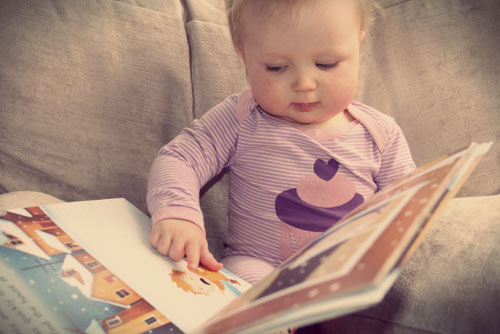纽约大学的一项新研究表明,教婴儿阅读的光盘、闪卡(抽认卡)和书等产品不能帮助提高婴儿的阅读能力。
这项研究发表在《教育心理》杂志上,研究对象是117名9到18个月的婴儿,他们被分成实验组和对照组。
研究员发给实验组婴儿的父母们一个针对婴儿的多媒体产品,其中包括光盘、带有单词和图片的闪卡和点读书,在接下来的七个月的时间里,他们要使用这个产品;而研究员没有给对照组的婴儿任何资料。
研究员们通过观察孩子们是否能辨认字母、读音、单词,能否辨认和理解单词来测试孩子们的语言能力。
实验结果表明,在13到14个评估中,实验组的婴儿和对照组的婴儿没有区别。唯一的区别就是实验组婴儿的家长认为自己的孩子学了新单词。

Despite all the DVDs, flashcards, and books designed to teach babies to read, these products do not help infants develop reading skills, according to a new study by researchers at New York University’s Steinhardt School of Culture, Education, and Human Development.
“While we cannot say with full assurance that infants at this age cannot learn printed words, our results make clear they did not learn printed words from the baby media product that was tested,” said senior author Susan Neuman, professor in NYU Steinhardt’s Department of Teaching and Learning.
Parents, however, seemed to put confidence in these products. In exit interviews, parents reported that their babies were learning to read from these products and that their children had benefited in vocabulary development.
“It’s clear that parents have great confidence in the impact of these products on their children,” Neuman explains. “However, our study indicates this sentiment is misplaced.”
The study, published in the Journal of Educational Psychology, involved 117 infants, ages nine to 18 months, who were randomly assigned to treatment and control groups. Babies in the treatment group received a baby media product, which included DVDs, word and picture flashcards, and flip books for parents to use over a seven-month period; babies in the control group did not receive any materials.
During a seven month period, the researchers conducted one home visit, four laboratory visits, and took monthly assessments of the babies’ language development.
In the laboratory, the researchers tested the babies’ skills by seeing if they could recognize letter names, letter sounds, vocabulary, words identified on sight, and comprehension. They did this by using a combination of eye-tracking devices and standardized tests to study outcomes at each phase of development.
Using state-of-the art eye-tracking technology, which detects even the slightest eye movements, the researchers could closely monitor how the infants shifted their gaze and their attention from one location to another when shown specific words and phrases.
The results showed no differences between the babies exposed to the reading products and the control group on 13 of the 14 assessments. The only assessment that showed a difference was parents’ beliefs that their baby was learning new words.
(来源:中国日报网爱新闻iNews 编辑:丹妮)
